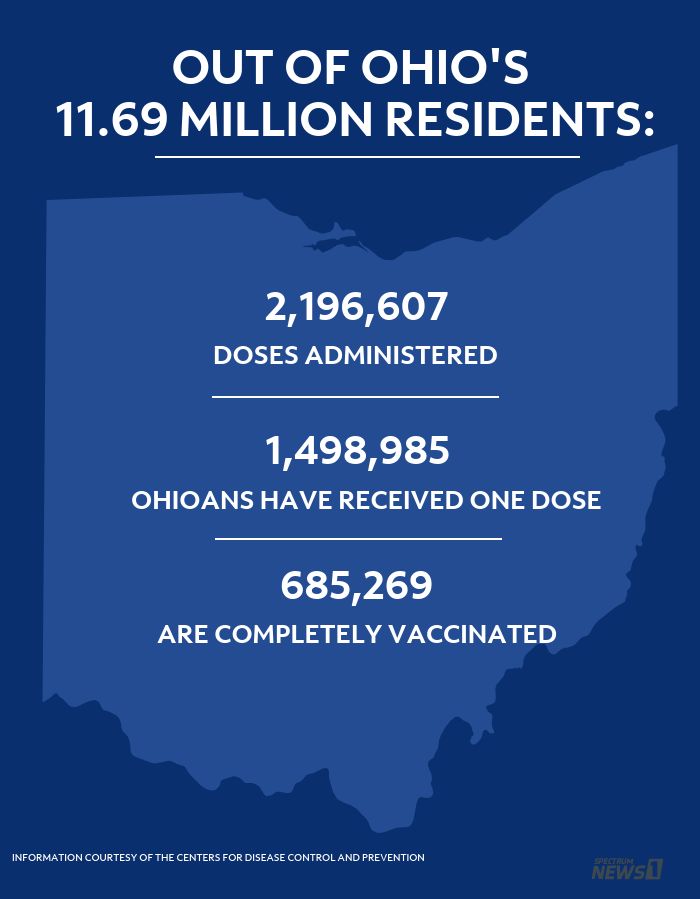CINCINNATI — For months, Linda Metz said her world has never been smaller. It’s limited to her bed, the birds outside her window, the physical therapist who stops by every few weeks and her family, who provide the bulk of her care.
The 72-year-old, bed-bound mother of two, is suffering from pulmonary fibrosis and hypertension — a high-risk candidate for the COVID-19 vaccine, but she can’t go out and get it.
And getting the vaccine to come to her has proved more difficult than the family expected.
Kevin Metz is Linda’s son and one of her three primary caretakers. Since the pandemic began, he said he’s been extremely careful about where he goes and what he brings back to his mother.
“We try to limit who comes in and out of the house as much as we can as we can and everyone wears masks,” he said. “If she was to get the virus, we don’t think she would last long."
Metz said the COVID-19 vaccine was supposed to be the light at the end of the tunnel.
“It would just be a weight off my shoulders,” he said.
The problem is, so far, vaccines for people like Linda are only available in clinics, and she hasn’t been able to leave her home since her last hospital stay.
Kevin said his mother’s condition worsened in the fall. She had to spend a few weeks in inpatient care, and transporting her required specialized medical equipment.
She spent some of her recovery in a long-term care facility, but Kevin said her Medicare only paid for a temporary stay, and she had to come home before the vaccine rollout began.
Now he fears, unless something changes soon, his mother may have missed her chance.
“Unless we can find someone to come out to the house, you know, to do it,” Kevin said.
The issue comes down to two factors: The limited supply of vaccines, and the difficulty that comes with storing and transporting them.
As of mid-February, 2.2 million Ohioans qualify for the coronavirus vaccine. The Centers for Disease Control and Prevention (CDC) reports less than 1.5 million have gotten at least one dose so far.

With nearly a million still waiting for their turn, clinics are already busy scheduling vaccinations at their facilities.
But storage can become an issue. Both the Pfizer and Moderna vaccines require strict storage requirements and are only available for a limited amount of time once the vial is opened. Coming out to a home to vaccinate one person could mean the rest of the doses in the vial going to waste.
“We, her family, have nowhere to turn,” Linda’s sister Brenda Ritter said. “It is a battle. If she was in a nursing home, she would have gotten the shot.”
Ritter is leading the family’s charge to get Linda vaccinated. She said she’s contacted all three Cincinnati-area hospitals, the Hamilton County Health Department, the Council on Aging and anywhere else she can think to turn. So far, she said they’ve gotten no guidance on what to do next.
“They will move her on their list to receive a shot but that will not help her,” she said.
Ritter is another one of Linda’s family caretakers and currently the only one eligible for a vaccination. She got her first dose earlier this month.
Getting Kevin and his brother vaccinated would be a workable solution until Linda can get her shot, but neither are eligible and likely won’t be for a while.
“I figure I’ll just wait my turn when it comes around,” Kevin said.
In the meantime, they don’t have the ability to isolate.
“We’re pretty much essential employees to go be around other things and then be around her is one of the biggest, hardest parts,” Kevin said.
Still, he said he’d rather see his mother come first.
AARP estimates 1.5 million family members across Ohio provide hours of care to their aging and disabled loved ones at home so the Metz family is far from alone.
On Feb. 11, the CDC came out with guidelines for vaccinating these individuals, but it requires significant pre-planning to ensure the safety of the patient and that no vaccine dose goes to waste.

Cities like Boston, Winston-Salem and Miami Beach have rolled out in-home vaccination services along these guidelines. Kevin hopes Cincinnati follows suit soon.
Until then, Linda said she’s grateful for the care her sister and sons can provide and after months of pandemic precautions. She trusts them to keep her safe.
“I always been very fortunate to have the sons I have,” Lina said. “They take care of me now. I don’t like it, but I don’t have much choice in the matter.”



